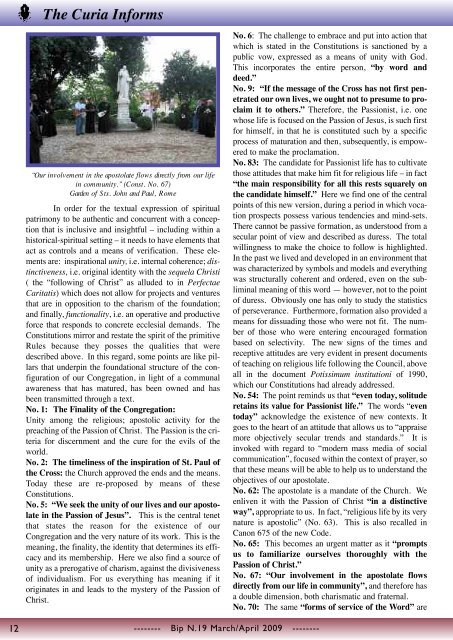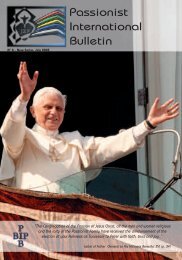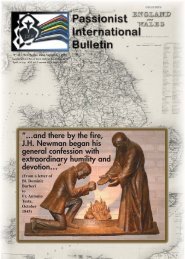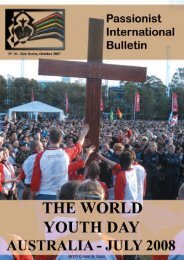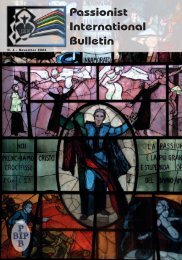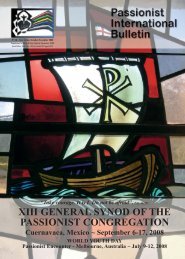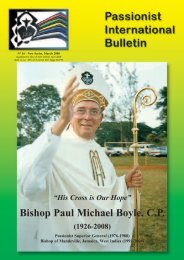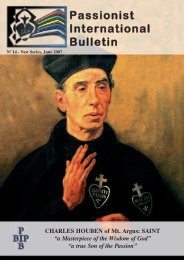The Curia Informs - Passio Christi
The Curia Informs - Passio Christi
The Curia Informs - Passio Christi
You also want an ePaper? Increase the reach of your titles
YUMPU automatically turns print PDFs into web optimized ePapers that Google loves.
<strong>The</strong> <strong>Curia</strong> <strong>Informs</strong><br />
“Our involvement in the apostolate flows directly from our life<br />
in community.” (Const. No. 67)<br />
Garden of Sts. John and Paul, Rome<br />
In order for the textual expression of spiritual<br />
patrimony to be authentic and concurrent with a conception<br />
that is inclusive and insightful – including within a<br />
historical-spiritual setting – it needs to have elements that<br />
act as controls and a means of verification. <strong>The</strong>se elements<br />
are: inspirational unity, i.e. internal coherence; distinctiveness,<br />
i.e. original identity with the sequela <strong>Christi</strong><br />
( the “following of Christ” as alluded to in Perfectae<br />
Caritatis) which does not allow for projects and ventures<br />
that are in opposition to the charism of the foundation;<br />
and finally, functionality, i.e. an operative and productive<br />
force that responds to concrete ecclesial demands. <strong>The</strong><br />
Constitutions mirror and restate the spirit of the primitive<br />
Rules because they posses the qualities that were<br />
described above. In this regard, some points are like pillars<br />
that underpin the foundational structure of the configuration<br />
of our Congregation, in light of a communal<br />
awareness that has matured, has been owned and has<br />
been transmitted through a text.<br />
No. 1: <strong>The</strong> Finality of the Congregation:<br />
Unity among the religious; apostolic activity for the<br />
preaching of the <strong>Passio</strong>n of Christ. <strong>The</strong> <strong>Passio</strong>n is the criteria<br />
for discernment and the cure for the evils of the<br />
world.<br />
No. 2: <strong>The</strong> timeliness of the inspiration of St. Paul of<br />
the Cross: the Church approved the ends and the means.<br />
Today these are re-proposed by means of these<br />
Constitutions.<br />
No. 5: “We seek the unity of our lives and our apostolate<br />
in the <strong>Passio</strong>n of Jesus”. This is the central tenet<br />
that states the reason for the existence of our<br />
Congregation and the very nature of its work. This is the<br />
meaning, the finality, the identity that determines its efficacy<br />
and its membership. Here we also find a source of<br />
unity as a prerogative of charism, against the divisiveness<br />
of individualism. For us everything has meaning if it<br />
originates in and leads to the mystery of the <strong>Passio</strong>n of<br />
Christ.<br />
No. 6: <strong>The</strong> challenge to embrace and put into action that<br />
which is stated in the Constitutions is sanctioned by a<br />
public vow, expressed as a means of unity with God.<br />
This incorporates the entire person, “by word and<br />
deed.”<br />
No. 9: “If the message of the Cross has not first penetrated<br />
our own lives, we ought not to presume to proclaim<br />
it to others.” <strong>The</strong>refore, the <strong>Passio</strong>nist, i.e. one<br />
whose life is focused on the <strong>Passio</strong>n of Jesus, is such first<br />
for himself, in that he is constituted such by a specific<br />
process of maturation and then, subsequently, is empowered<br />
to make the proclamation.<br />
No. 83: <strong>The</strong> candidate for <strong>Passio</strong>nist life has to cultivate<br />
those attitudes that make him fit for religious life – in fact<br />
“the main responsibility for all this rests squarely on<br />
the candidate himself.” Here we find one of the central<br />
points of this new version, during a period in which vocation<br />
prospects possess various tendencies and mind-sets.<br />
<strong>The</strong>re cannot be passive formation, as understood from a<br />
secular point of view and described as duress. <strong>The</strong> total<br />
willingness to make the choice to follow is highlighted.<br />
In the past we lived and developed in an environment that<br />
was characterized by symbols and models and everything<br />
was structurally coherent and ordered, even on the subliminal<br />
meaning of this word — however, not to the point<br />
of duress. Obviously one has only to study the statistics<br />
of perseverance. Furthermore, formation also provided a<br />
means for dissuading those who were not fit. <strong>The</strong> number<br />
of those who were entering encouraged formation<br />
based on selectivity. <strong>The</strong> new signs of the times and<br />
receptive attitudes are very evident in present documents<br />
of teaching on religious life following the Council, above<br />
all in the document Potissimum institutioni of 1990,<br />
which our Constitutions had already addressed.<br />
No. 54: <strong>The</strong> point reminds us that “even today, solitude<br />
retains its value for <strong>Passio</strong>nist life.” <strong>The</strong> words “even<br />
today” acknowledge the existence of new contexts. It<br />
goes to the heart of an attitude that allows us to “appraise<br />
more objectively secular trends and standards.” It is<br />
invoked with regard to “modern mass media of social<br />
communication”, focused within the context of prayer, so<br />
that these means will be able to help us to understand the<br />
objectives of our apostolate.<br />
No. 62: <strong>The</strong> apostolate is a mandate of the Church. We<br />
enliven it with the <strong>Passio</strong>n of Christ “in a distinctive<br />
way”, appropriate to us. In fact, “religious life by its very<br />
nature is apostolic” (No. 63). This is also recalled in<br />
Canon 675 of the new Code.<br />
No. 65: This becomes an urgent matter as it “prompts<br />
us to familiarize ourselves thoroughly with the<br />
<strong>Passio</strong>n of Christ.”<br />
No. 67: “Our involvement in the apostolate flows<br />
directly from our life in community”, and therefore has<br />
a double dimension, both charismatic and fraternal.<br />
No. 70: <strong>The</strong> same “forms of service of the Word” are<br />
12<br />
-------- Bip N.19 March/April 2009 --------


